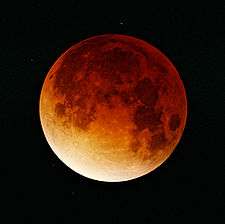Definify.com
Webster 1913 Edition
Eclipse
E-clipse′
(ē̍-klĭps′)
, Noun.
1.
(Astron.)
An interception or obscuration of the light of the sun, moon, or other luminous body, by the intervention of some other body, either between it and the eye, or between the luminous body and that illuminated by it. A lunar eclipse is caused by the moon passing through the earth’s shadow; a solar eclipse, by the moon coming between the sun and the observer. A satellite is eclipsed by entering the shadow of its primary. The obscuration of a planet or star by the moon or a planet, though of the nature of an eclipse, is called an
occultation
. The eclipse of a small portion of the sun by Mercury or Venus is called a transit
of the planet. ☞ In ancient times, eclipses were, and among unenlightened people they still are, superstitiously regarded as forerunners of evil fortune, a sentiment of which occasional use is made in literature.
That fatal and perfidious bark,
Built in the
Built in the
eclipse
, and rigged with curses dark. Milton.
2.
The loss, usually temporary or partial, of light, brilliancy, luster, honor, consciousness, etc.; obscuration; gloom; darkness.
All the posterity of our fist parents suffered a perpetual
eclipse
of spiritual life. Sir W. Raleigh.
As in the soft and sweet
When soul meets soul on lovers' lips.
eclipse
,When soul meets soul on lovers' lips.
Shelley.
E-clipse′
,Verb.
T.
[
imp. & p. p.
Eclipsed
(ē̍-klĭpst′)
; p. pr. & vb. n.
Eclipsing
.] 1.
To cause the obscuration of; to darken or hide; – said of a heavenly body;
as, the moon
. eclipses
the sun2.
To obscure, darken, or extinguish the beauty, luster, honor, etc., of; to sully; to cloud; to throw into the shade by surpassing.
“His eclipsed state.” Dryden.
My joy of liberty is half
eclipsed
. Shakespeare
E-clipse′
,Verb.
I.
To suffer an eclipse.
While the laboring moon
Eclipses
at their charms. Milton.
Webster 1828 Edition
Eclipse
ECLIPSE
,Noun.
1.
Literally, a defect or failure; hence in astronomy, an interception or obscuration of the light of the sun, moon or other luminous body. An eclipse of the sun is caused by the intervention of the moon, which totally or partially hides the sun's disk; an eclipse of the moon is occasioned by the shadow of the earth, which falls on it and obscures it in whole or in part, but does not entirely conceal it.2.
Darkness; obscuration. We say,his glory has suffered an eclipse.All the posterity of our first parents suffered a perpetual eclipse of spiritual life.
ECLIPSE
,Verb.
T.
1.
To obscure; to darken, by intercepting the rays of light which render luminous; as, to eclipse the moon.2.
To cloud; to darken; to obscure; as, to eclipse the glory of a hero. Hence,3.
To disgrace.4.
To extinguish.Born to eclipse thy life.
ECLIPSE
,Verb.
I.
